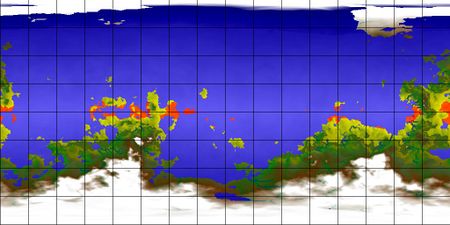User:Trekkie0587/Sandbox2: Difference between revisions
Trekkie0587 (talk | contribs) No edit summary |
Trekkie0587 (talk | contribs) No edit summary |
||
| Line 40: | Line 40: | ||
* '''Languages Spoken:''' Esperanto | * '''Languages Spoken:''' Esperanto | ||
* '''Regions/Provinces:''' Northern Polar Region, Southern Polar Region, Crindi Province | * '''Regions/Provinces:''' Northern Polar Region, Southern Polar Region, Crindi Province | ||
* '''Capitals:''' Sez Toural | * '''Capitals:''' Sez Toural, Uz Sabahnuor | ||
* '''Points of Interest:''' Sez Magan Space Port (Southern Polar Region), Ositana Mountain Region, Khilas International Space Port, Akvo Mangxi Cafe (Crindi Province), Toural Mountains (Southern Polar Region) | * '''Points of Interest:''' Sez Magan Space Port (Southern Polar Region), Ositana Mountain Region, Khilas International Space Port, Akvo Mangxi Cafe (Crindi Province), Toural Mountains (Southern Polar Region) | ||
Revision as of 23:58, 18 December 2018
| Stellar Cartography |
|---|
| Galactic Atlas • Campaign Regions • Spatial Regions • Star Systems • Nebulae • Star Charts |
Leya-I, also referred to as "Luraul", is the homeworld of the Al-Leyan people, located in the Luraul system of the Beta Quadrant. Home System
Home World
Additional Information
Geography and ClimateMuch of the planet is very hot and bright during the day. Due to this they retire to their homes during the hottest and brightest part of the day to take their rest. Their homes are designed to help keep them cool. When the race was young, they would shelter in caves and in other cool spots in the forest. The trees have adapted to the planet's hot sun with tough bark and leaves and flowers that curl up during the hottest part of the day to prevent them from becoming dry and burning. TropicalThese regions lie closest to the equator and experience temperatures ranging from 29 to 30 degrees celsius (83 to 85 degrees fahrenheit), seeing rainfall from 200 to 1000 cm (80 to 400 inches) per year. As a result, humidity is always fairly high (77% to 88%). Trees in some areas grow in thick groves and can reach as high as 300 feet tall. Rope bridges have been discovered built into some of the thicker patches of trees, believed to be the ancient pathways their ancestors walked to keep safe from predators at night. These pathways are known as the Pontoj De Arboj, or the Tree-Walker Bridges. SubtropicalLying more toward the middle of the landmasses, these areas are characterized by hot, humid summers (22 degrees celsius and above) and mild, chilly winters (0 to 18 degrees celsius). In these regions (most often coastal), rainfall peaks in the summer with annual precipitation ranging from 75 to 200 cm (30 to 79 inches). The Crindi Province is a small coastal region known for its succulent seafood, particularly a dish called Kornan Longoniŝa kuvon (Horned Longfish stew). MountainousThese areas are wetter and windier than low-lying areas, though temperatures decrease with altitude and weather conditions can change dramatically in as little as an hour. Particularly high peaks are covered in snow year round. The Ositana Mountain Region is particularly popular for recreational activities. PolarGovernmentThe Al-Leyans operate under a world unitary government. While many of the different nation states on Leya-I have their own councils which may govern local policies, each of these nations subscribes to the global government through the attendance of representatives from each region. The united world government was instated in 1988. Commerce and EconomyThe Al-Leyan monetary system can be confusing to off-worlders as it operates on a nonary system.
| ||||||||||||||||||||||||||||||||||||||||||||||||||||||
| Galactic Atlas |
|---|
References



